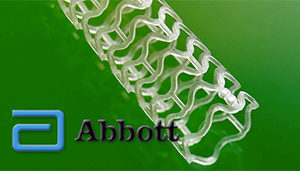 Abbott (NYSE:ABT) plans to restrict the use of its Absorb bioresorbable stent in Europe after a clinical study found a higher risk of serious adverse events.
Abbott (NYSE:ABT) plans to restrict the use of its Absorb bioresorbable stent in Europe after a clinical study found a higher risk of serious adverse events.
In a March 31 letter to physicians (posted online April 5 by a prominent cardiologist from Atlanta), Abbott said it would restrict use of the Absorb and Absorb GT1 devices to clinical registry studies as of May 31.
“Limiting use to these registries will enable systematic data collection to address questions raised from recent congresses about 3-year clinical data and analysis from Absorb III regarding the frequency of scaffold thrombosis and the duration of optimal [dual anti-platelet therapy] after implantation,” the company wrote in the letter. “These important containment measures are bing undertaken in light of recent concerns over elevated rate of major adverse cardiac events, specifically myocardial infarction and scaffold thrombosis, while we await further data to confirm whether improved implantation techniques will mitigate these higher event rates and for the evaluation of longer-term benefit associated with Absorb.”
Abbott said it plans to review the registry data in the summer of 2018.
Data unveiled in March at the annual conference of the American College of Cardiology showed that Absorb confers a higher risk of serious adverse events at 2 years compared with Abbott’s Xience drug-eluting stent, according to new data from a study that prompted the FDA to warn physicians on the risk.
But the picture is clouded by new guidelines indicating the proper blood vessel size and implantation technique; some 19% of patients in the 2008-subject trial were implanted in arteries that are now deemed too small for the device. Excluding those patients, the difference between the 2 stents was not statistically significant, according to the study.
The results showed that 10.9% of patients in the Absorb arm showed higher rates of target lesion failure (a composite of heart-related death, heart attack related to the treated vessel and revascularization), compared with 7.9% for the Xience cohort. The rate of heart attack was also higher for the Absorb contingent, at 7.3% compared with 4.9% for Xience. The FDA has said it’s investigating the higher adverse event rate for Absorb, which it approved in July 2016 with the proviso that Abbott run a 5-year post-market study of the device.
An Abbott spokesman said a U.S. trial of the device is still under way.
“The registries will parallel post-approval observational studies and training being conducted in other parts of the world, including the ABSORB IV study of 3,000 patients in the United States to confirm the effect of current implantation technique on clinical outcomes,” TCTMD reported.
Dr. Prashant Kaul, the cardiologist at Atlanta’s Piedmont Heart Institute who broke the news in the U.S., told the website that the pause is appropriate.
“I think it is sensible to proceed with caution as is being done in Europe,” Kaul said. “U.S. operators have already become more circumspect in light of the emerging data and recent FDA letter. I would expect that we will follow suit and restrict use to registry sites and the most experienced operators.
“I think bioabsorbable technology remains the Holy Grail in our field and an important pursuit,” he added. “We also have a responsibility to our patients to ensure that we introduce new technologies in the safest manner, and we should continue to collaborate to that end.”
Yesterday, cardiologist Dr. Debabrata Mukherjee penned an editorial for the New England Journal of Medicine, encouraging cardiologists to stick with conventional drug-eluting stents and stay away from the bioresorbable devices. Mukherjee specifically warned against Abbott’s Absorb stent in his commentary, citing the device’s increased risk of device thrombosis.
“Because the current generation of metallic drug-eluting stents is associated with excellent outcomes, there is little rationale to use bioresorbable vascular scaffolds at this time,” he wrote.
“Bioresorbable stents cost more than the typical metallic stent and they take longer for cardiologists to insert. They are also no more effective, and less safe. As a physician, why I am going to use something that costs me more if it can cause risk or harm to my patients?”

